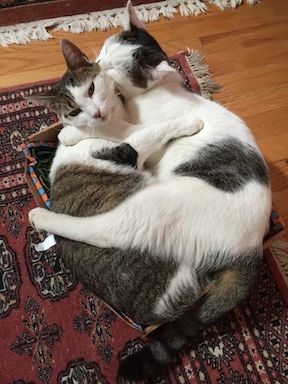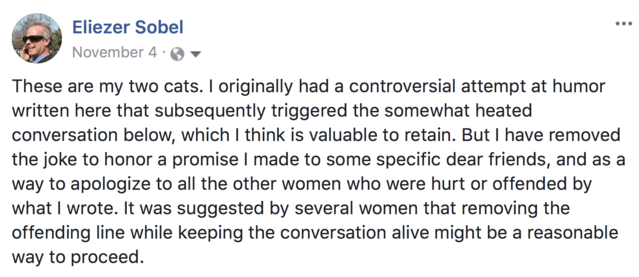It started innocently enough. My wife Shari texted me yet another irresistible photo of our two Jewish cats: Reb Nachman of Breslov (named after Reb Nachman of Breslov), and Shlomo-Bob Schneerson (named after our friend Bob who converted to Judaism and became Shlomo-Bob, and Schneerson is an homage to the late Rebbe of the Hasidic Chabad community, who some believed was the Messiah. We think Shlomo-Bob is the Messiah—the cat, not the man.)
Here is the photo (prepare for incoming cuteness):

I opted to post it on Facebook, where I’ve managed to accumulate 2,770 “Friends,” most of whom I don’t know from Adam, although they are either friends of friends of friends of friends, or else possibly people who have read my writings somewhere.
In any event, despite that high number, which I intentionally cultivated, thinking it would somehow help me be a more successful or widely-read author, I discovered early on that if I posted a link to a new article I had published online, it would receive perhaps seven “LIKES.” (Meaning that seven people among the roughly two billion Facebook users around the world were expressing their appreciation for my post. It does not mean they actually clicked on the link and read my article. Perhaps one of the seven did that.)
However, when I posted a funny cat picture I’d be immediately showered by hundreds of LIKES, like rose petals floating down from Facebook Heaven, praising me for my good works. Those who are much smarter and more tech-savvy than me insist that Facebook is nevertheless THE perfect place to sell your wares, promote your project, or expand your business. I have reached quite the opposite conclusion from my experience, which I can summarize like this:
- Using Facebook for business or personal gain: No good.
- Using Facebook to share fascinating, personal, funny, or poignant things: Very good.
In any event, once I had the photo up, I needed a clever caption, and being the shallow, clueless, insensitive, white-privileged-male-who-unwittingly-contributes-to-misogynistic-rape-culture that I am (a fact that was soon to be pointed out to me by a variety of different women), I came up with this brilliant caption:

Then all hell broke loose, and I literally spent two full days of my life on Facebook in what turned out to be a useful dialogue. But there was a trail of blood and tears along the way. I truly had had no idea that my post would be perceived as somehow demeaning to, or undermining the depth and gravity of, the #MeToo movement. I was aiming for a chuckle, not a revolution and possible beheading.
But had it been this cut and dried, the solution would have been quick and easy: apologize and take the post down. (Spoiler alert: I eventually apologized and took the post down.) But in fact, while the error of my ways was being made abundantly clear to me, I was receiving a concurrent wave of support from women as well. I heard from victims of rape and assault, telling me that they had found it funny, that “your humor is healing” and that they knew I wasn’t diminishing the seriousness of the #MeToo movement. They urged me to keep expressing myself authentically, that it is “a valuable offering in the world.” (I loved getting those.)
I likewise heard from a former Sexual Assault Crisis Counselor who found it funny. My wife Shari, whose opinion carries at least 49% of the vote in my psyche, or possibly 51%, found it funny. At the same time, those who were justifiably and legitimately outraged, hurt, or offended by their perception of my post, demanded I take it down so as to honor their pain and courage in speaking aloud their #MeToo’s. Other women, however, were simultaneously requesting that I "please keep the post up" because they were finding the dialogue it had triggered amongst themselves as women to be rich and valuable.
I felt stuck between a rock and a hard place. Then, to make matters even more delicate and tender, someone brought up my beloved goddaughters, and several women asked me if I would have posted that joke if my goddaughters had been assaulted or harassed. After giving it some thought, my answer was “Yes, if I thought it would make them giggle and lighten their load; and no, of course not, if it contributed to their further suffering.”
Somehow this portion of the conversation unfolded in such a way that I wound up declaring, “If my goddaughters, in conjunction with my wife, say that I should take the post down, I will take it down.”
I was quick to learn how little I really knew my goddaughters. They had somehow transformed overnight from adorable 3 and 6 year olds into feisty, brilliant, sharp-tongued, strong-opinioned, tough-talking, radical leftist, gender-fluid feminists, now 17 and 20 years old. In other words, yes they wanted the post removed pronto, and no, they were not at all happy with me. Nor was their mother, one of my best friends in the world, who is married to one of my other best friends in the world. So in a way, a family dispute was playing itself out on the world’s Facebook stage.
Shari had not participated in the marathon two-day dialogue, but since I had now authorized her to help decide the outcome, people out there were waiting for her to comment, so she finally weighed in:
“First, no final say, just a question: In Fatwa scenarios, do they generally take out the wife as well?”
Obviously, I married her for the comedy. Lately, every time there is a Breaking News story about another powerful, famous man being accused of sexual misconduct, Shari will invariably say:
“Wow, it is really a bad time to be a man; it’s a good thing you’re not in public office.”
She was kidding about the public office bit. (I think.) For I believe I have mostly been one of those feminized, Sensitive New Age Guys (SNAGS) who knows the right things to say and even the right things to feel, and I have largely embodied that way of thinking and feeling such that it informs my behavior in relationships with women. Mostly. But that doesn’t at all mean that my primitive, politically-incorrect inner teenager, who spent an inordinate amount of his early life looking at Playboy while fantasizing and more, is in any way absent or long gone, much as I do wish he were long gone and had been replaced by a mature sexuality that more closely approximates intimate trust and connection with a real human.
Nevertheless, some women who know me fairly well tried to invoke the old, “But this was Eliezer” defense (second only to the “Twinkie Defense” as an excuse for doing something regrettable.) They were saying, in effect, “But this was our friend, Eliezer; we all know he’s not like that.” To which the other side replied, “Yes he is like that, because he posted this post.”
And they were right. I am “like that” (depending, of course, on how you define “that.” Bill Clinton, unfortunately, only explored the meaning of "is," not "that.") But many fine, upstanding, pro-women men out there are also “like that.” I know them personally. We may adhere externally to a fairly strict code of correct behavior, feminist ethics and appropriate speech, but those outer constraints never truly remove the underlying, fundamental reality of who we know ourselves to be in our uncensored, albeit distorted and damaged, sexual nature.
Our collective male primordial sexual conditioning is a force most of my generation virtually inhaled inside of the Hefner-inspired cultural atmosphere we grew up in, teaching us exactly what constitutes a sexually desirable woman, as well as how to regard them. (By “regard,” read “objectify.”) And those views and assumptions were very deeply embedded in our (heterosexual/cisgender) psyches and subconscious—those of men and women—and they are not so easy to uproot, dismantle, disengage from, or completely remove.
According to my very personal research, most “acceptable” men—i.e., that handful of us who are not yet facing criminal charges—often harbor a huge range of possibly very disturbing sexual fantasies that objectify women. That fact alone is what makes us “like that,” and the financial viability and availability of 33 billion Internet porn sites (give or take 20 billion) backs up my data. My own habitual sexual response to a very narrow range of women kicked into gear for me around the age of 12 or 13, after receiving my first copy of CLIMAX from a more experienced friend, and it simply never stopped. Sadly, as most of us know by now, the ubiquitous habit of the pornographic approach to self-pleasuring as practiced by so many men is tragically unrelated, from the very start, to real people, genuine relationship with another, or certainly anything remotely resembling love. It all got mixed up, off on the wrong track, and neuronally embedded at precisely our most vulnerable and impressionable age, just when the onslaught of puberty and the relentless ravages of rampaging hormones took over the reins and brains.
So Shari was right in one sense: If my sexual thoughts and fantasies were ever inspected or policed, I would have been locked up a long time ago. But I wouldn’t be lonely because I’d be sharing a cell with a lot of my male friends, most of whom share this tightrope we walk between being a staunch, public feminist ally, while nevertheless retaining a developmentally-arrested, hidden sexuality, a private place in our psyches that is known only to certain friends, mostly male, who clearly suffer with the same dual nature, and with whom we can at least commiserate.
(I fully expect to hear from a slew of men in the Comments section, disabusing me of this over-generalized characterization of our noble gender.)
I was also taken to task on Facebook for making the wishes and feelings of my goddaughters more significant and important than the many adult women who had already clearly expressed that I had hurt them, as if I only cared when the pain was happening to someone in my intimate world. I had to acknowledge to myself that yes, the idea of causing pain in my goddaughters did seem to carry more weight in my heart, even though it shouldn’t have, and perhaps it wouldn’t have to a more evolved soul.
Right or wrong, the younger, still-a-minor goddaughter’s demand that the post come down was the deciding factor for me, along with hearing the horror stories of her life as a young woman in a world filled with male creeps popping up everywhere and every day in one form or another. Then several women suggested that I simply remove the #MeowToo joke, but leave the conversation it had catalyzed up on my Facebook page for those who were finding it useful, and simply add an explanation at the top as to why such a prolonged and heated exchange had been prompted by a seemingly random cat picture. This is what I substituted:

And so the whole thing is still up there, on my Facebook page, and me being an un-famous author and all, my page is open to the public should you want to peruse it: FACEBOOK/Eliezer, but you’ll have to scroll down quite a bit to get past all the relatively innocuous things I’ve posted since then to get the heat off me until the Facebook hive mind is collectively distracted by some other passing news item, like, say, imminent nuclear war with North Korea.
My closing statement, your Honoress: Given that I’ve never been accused of sexual misconduct, though I am guilty-as-charged of posting a cat photo with an ill thought out caption that was hurtful to some, I’m hereby requesting that those women of the world who don’t hate me kindly plead my case at your next General Board Meeting, and ever-so-gingerly suggest to the rest of your constituents that I am among their male allies in the big picture, so perhaps some forgiveness would be in order. It would be a huge relief for me, but that’s up to each individual woman.
In the meantime, to those I hurt, #MeSorry.




